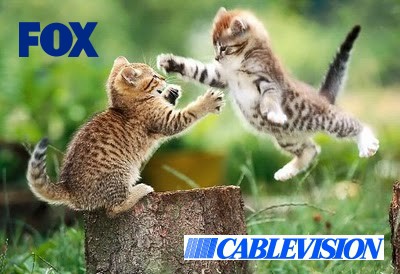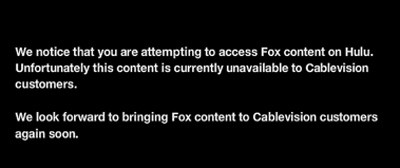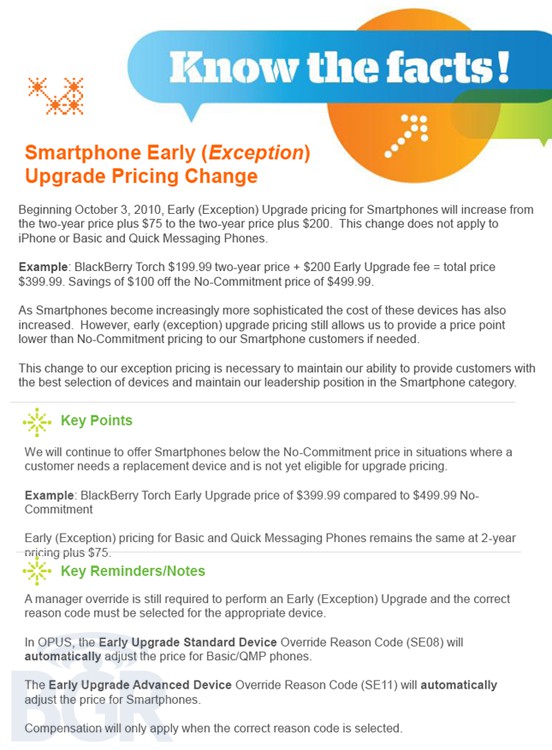
Another fight over retransmission consent leaves New York-area Cablevision subscribers in the middle of a dispute they will ultimately pay for.
At 12:01am Saturday, an unintended economic stimulus package kicked in for New York area sports bars as News Corporation yanked Fox network affiliates in New York and Philadelphia from Cablevision subscribers in a dispute over programming fees.
WNYW-TV (Fox), WTXF-TV (Fox), WWOR-TV (MyNetwork TV), Nat Geo WILD, Fox Business Channel, and Fox Deportes were all replaced with a looped message from Cablevision attacking Fox for negotiating in bad faith and greedily demanding more money than the cable company pays for every other New York area broadcaster, combined.
The dispute sent sports fans scurrying for access to weekend sporting events blacked out on the cable system serving Brooklyn, Long Island, and parts of Connecticut and New Jersey. Cablevision customers were denied yesterday’s New York Giants-Detroit Lions football game and Philadelphia Phillies-San Francisco Giants baseball playoff game. For a brief period, Fox raised the ante by also blocking Cablevision broadband subscribers from accessing Fox programming on Hulu, until political pressure and complaints from consumer groups forced Fox to retreat.
At issue, as always, is money. Broadcasters are increasingly insistent on being paid for the right to retransmit their programming over cable systems. Without agreements, a broadcaster can insist that a cable system drop their station(s) from the lineup until a retransmission consent agreement can be reached.
For years, many smaller independent stations fought to get on cable systems — for free — especially in areas where poor reception made it difficult to watch. Broadcasters increased local advertising rates thanks to the extended viewing area many cable systems provide.
But now that local ad revenue is not what it used to be, and with viewers going online for access to their favorite shows, agreements increasingly require cash payments for permission to carry stations.
For the nation’s largest television market — New York City, the amounts exchanged can be staggering — well over $100 million dollars each year. With that kind of money at stake, disputes have become almost routine, and area viewers are sick of it.
“It’s all about the money,” complained resident Joe Figueroa. “They’re always greedy.”
Figeroa and fellow Bronx resident Shinequa Gaillard told WNBC-TV these disputes always leave customers in the middle.

Fox briefly yanked its shows on Hulu Sunday for Cablevision customers attempting to bypass the dispute
“I think neither one of the two are thinking about the customers and the viewers — neither one of them,” Gaillard said. “As consumers, what can we do? Nothing.”
Briefly over the weekend, viewers hoping to bypass the dispute by watching Fox programming on Hulu learned the network had decided to involve Cablevision’s broadband subscribers in the fight as well — blocking access to Fox-owned content. Some of our readers, include PreventCAPS, noticed.
Stop the Cap! reader and Cablevision subscriber Jim in Garden City, N.Y., discovered the programming blockade when he tried to watch an episode of COPS on Hulu.
“Fox has gone hardball on us by blocking Hulu for anyone with a Cablevision IP address,” Jim writes. “This is how these bastards operate, cutting off programming even for those like me who don’t even have cable TV and should not be involved in this debate at all.”
Jim uses a rooftop antenna to access local stations, and does not subscribe to a Cablevision video package. He’s convinced this is exactly why we need Net Neutrality enforced by law in the United States.
“Imagine if this was Comcast-NBC vs. Fox,” he warns. “Do you think Comcast wouldn’t think twice of pulling the plug on Fox’s website and video content if the two hated one-another? They’d flip that switch off in a second.”
The implications did not go unnoticed by Free Press and other consumer groups.
“Consumers should have the right to watch online content, and this access should not be tied to a dispute over cable television carriage arrangements,” said S. Derek Turner, research director for Free Press. “This move is also an example of a major user of public spectrum abusing the public interest.”
The matter quickly also went political, triggering an angry response from Rep. Ed Markey (D-Mass.) urging the Federal Communications Commission to step in and “actively defend Internet freedom and consumer rights.”
A few hours after statements like that, Fox pulled back and restored access, but the point was made for those who recognize media companies have major involvement in online and over-the-air programming.
Rep. Steve Israel (D-N.Y.), whose district includes shut-out Cablevision subscribers, thinks these disputes have become way too common.
Cablevision subscribers have endured short-term lockouts from Food Network and HGTV, networks owned by ABC-Disney, and now this latest dispute with Fox. Israel wants binding arbitration for these types of disputes, if only to shield customers from one side or the other yanking access:
“I spoke to officials today at the FCC and they confirmed they have offered to mediate arbitration and pledged to keep the heat on both parties to come to the table without disrupting service. Haven questioned Chairman Genachowski about this issue in March, I know that he shares my concerns about the continued brinkmanship of these negations that threaten to leave customers in the dark. I’m disappointed that both parties haven’t agreed to hold Giants fans harmless while negotiations continue.”
While Cablevision announced it was willing to enter arbitration to resolve the dispute, Fox officials refused, claiming it would reward bad behavior by the cable company.
Both players have their own websites defending their respective positions and trying to sign up viewers to help fight the battle.
News Corporation, which owns Fox, runs KeepFoxOn and is encouraging Cablevision subscribers to cancel subscriptions and switch to Verizon FiOS or satellite television. It also accuses Cablevision of hypocrisy over their resistance to paying “fair fees” for Fox-owned programming.
Lew Leone, vice president and general manager of News Corporation’s WNYW and WWOR-TV says Cablevision wants special treatment:
Instead of negotiating like a responsible business, Cablevision decided to make this your problem in the hope that if they caused you, the viewer, enough inconvenience, then politicians would intervene.
That is what Cablevision’s call for “arbitration” is all about. But ask yourself – do you think Cablevision would be ok with someone else stepping in to decide the price you pay them for cable and broadband service?
And the Cablevision family certainly doesn’t allow arbitrators to set the rates for their cable channels like MSG and AMC. In fact, just a few weeks ago, MSG and MSG Plus went off the dial for millions of DISH Network subscribers – and MSG did not ask for arbitration.
Cablevision has called us greedy. It’s an interesting charge, given the fact that the price we’ve offered Cablevision for FOX5 and My9 is more than 70% lower than what the Cablevision family charges other cable operators for MSG and MSG Plus.
Frankly, it is hard to believe a company like Cablevision is accusing anyone else of greed. Cablevision customers pay an average of $149 per month including up to $18 for broadcast stations – and that earned them an average profit of over $795 per subscriber last year. Yet, they have only offered to pay less than a penny a day for FOX5 and My9.
Cablevision has stated that they intend to provide you with a rebate. But if the rebate is equal to what they offered Fox for our stations, you can look forward to a credit of less than 30 cents on your next bill.
 Cablevision officials fire back that they won’t be bullied. The Cablevision website, along with a video airing on blacked out channels, accuses Fox of greedily demanding $150 million for stations, many of which customers can watch for free over-the-air:
Cablevision officials fire back that they won’t be bullied. The Cablevision website, along with a video airing on blacked out channels, accuses Fox of greedily demanding $150 million for stations, many of which customers can watch for free over-the-air:
- Cablevision currently pays 70 million dollars per year for News Corp’s programming (which includes channels such as FOX 5, My9, FOX Business Network, National Geographic Wild, and FOX Deportes), and now they are asking for more than 150 million dollars for the exact same programming – no new programming, just another 80 million dollars per year for News Corp.
- Cablevision has reached agreement with every other major broadcast station, including CBS, NBC, ABC and Univision. But News Corp is demanding more in fees for FOX 5 and My9 than Cablevision and our customers pay for all of the other broadcast stations combined!
- We think in these economic times that this is outrageous, especially since FOX 5 and My9 are available for free over the air, and they make many of their most popular shows available for free on the Internet.
- News Corp has pulled the plug on their most popular programming, holding viewers hostage until their unreasonable demands are met. NFL Football, the MLB playoffs and World Series, House and Glee are just a few of the programs that News Corp is depriving their viewers of in an attempt to bully us into accepting their unfair demands.
- Cablevision is willing to accept binding arbitration from an independent 3rd party to settle this dispute. We call on News Corp to accept binding arbitration, and to put FOX 5 and My9 back on the air for our customers until we can come to a fair agreement.
Both sides have publicized their views in the local media, including full page ads in New York tabloids. One from Fox targeted Cablevision’s owners personally, accusing the Dolan family of getting top dollar for lesser-watched sports networks under the MSG umbrella while playing hardball over program fees for channels 5 and 9, heavily viewed in the New York area.
Right now, Cablevision pays about 25 cents per month for both broadcasters. News Corporation reportedly wants a dollar per month.
Forbes entertainment columnist Lacey Rose warns these repeated battles may bring unintended consequences from viewers, especially for Fox:
The networks’ current strategy –block programming while trading barbs with the cable operator in question—may do more harm than good, however, as consumers are (further) incentivized to find new ways to occupy their time. (Much as they did during the 100-day writers’ strike, when new scripted programming was shelved for months.) Still more worrisome, the resulting fees that will be passed down to already cash-strapped subscribers in the form of higher cable bills could end up pushing them away forever.
In an era of 1,000-plus channels and infinite entertainment on the Internet, the broadcast networks are already in a precarious position with younger viewers, which advertisers pay a premium to reach. Blackouts or not, nearly 70% of cord cutters are under the age of 34, according to a BTIG study released last month — and that doesn’t include a growing subset of these younger, tech-savvy viewers who never even bother with a cable subscription, preferring entertainment outlets like Hulu and Netflix for their content. Though the networks are loathe to admit it, viewership continues to decline as the median age of the audience at the big four rises. In fact, thus far this season the median age of a prime-time viewer is 50 years old, according to The Nielsen Company.
But at least for now, as negotiations continue in the third day of the programming blackout, there appears to be no end in sight. Cablevision has even engaged in some programming blackouts of its own, denying access to today’s New York gubernatorial debate to Verizon FiOS, which prompted an angry response from the phone company.
“Verizon FiOS TV customers and millions of other viewers served by other providers across the state have essentially been blacked out of the debate, denying them their rights as citizens and voters, since Cablevision is the sole broadcaster of the event,” said Michelle Webb, general manager and chief programming officer of FiOS1, Verizon’s news channel for Long Island and northern New Jersey. “And while the broadcast will be available on certain websites and some radio, those may not be practical solutions for many people.”
[flv width=”640″ height=”500″]http://www.phillipdampier.com/video/Fox Cablevision Dispute 10-18-10.flv[/flv]
Stop the Cap! brings you a comprehensive roundup of coverage from the New York area regarding the Cablevision-Fox dispute, with coverage from WNYW, WABC, and NY 1 television, Cablevision and Fox themselves, and WINS and WCBS Radio. (14 minutes)


 Subscribe
Subscribe












